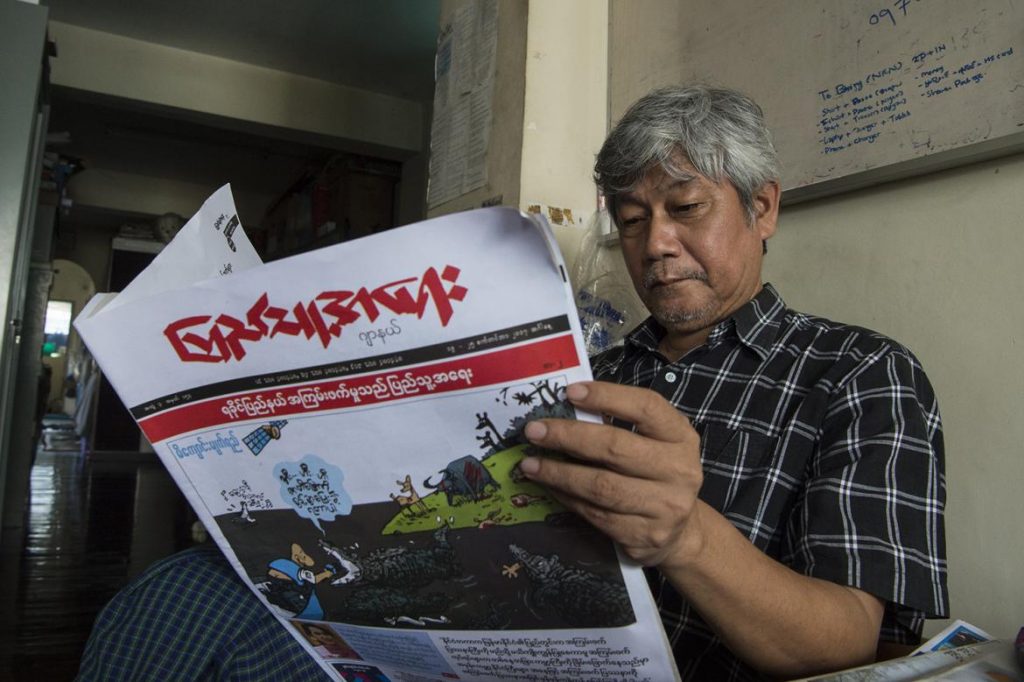By AIDAN JONES & ATHENS ZAW ZAW | AFP
YANGON — Cartoons taking aim at Rohingya are spreading rapidly across social media in Myanmar, where public opinion on the crisis stands in stark contrast to the outcry overseas.
Fanned by Myanmar’s civilian and military leaders, an information war has taken hold and is being embraced with gusto by a legion of satirists, meme-makers and internet trolls.
Local cartoonists, many of whom earned their revered status for skewering the former junta, have taken aim at the Rohingya.
One widely-shared sketch called ‘crocodile tears’ shows a group of reptiles swimming away from a bank of mutilated animals towards an eager Western cameraman.
Support more independent journalism like this. Sign up to be a Frontier member.
“I had to flee my motherland,” a crying crocodile says into the microphone, a swipe at the testimonies of Rohingya refugees who have arrived in Bangladesh with accounts of atrocities by Myanmar’s army.
“There is something untrue about what they (the Rohingya) are saying,” Win Naing, one of Myanmar’s most famous cartoonists, told AFP.
The 58-year-old, whose pen name is Aw Pi Kyeh, said he just wanted to provoke thought in a highly charged situation.
“We draw cartoons with a spirit that loves the country.”
Anti-Rohingya diatribes are being ‘liked’, shared and retweeted — reinforcing long-held religious hatreds against the minority.
Since late August, around 430,000 Rohingya have fled to Bangladesh, escaping an army crackdown in Rakhine State which the UN has called ‘ethnic cleansing’.
Keyboard warriors
Armed with crass humour, internet fame and riding a wave of public opinion, cartoonists have delivered sharp counter-punches.
When Malala Yousafzai condemned fellow Nobel laureate Daw Aung San Suu Kyi for failing to speak up for the Rohingya, one cartoonist hit back with a rendering of the Pakistani activist with human excrement instead of brains — a grim reference to her surgery after being shot in the head by the Taliban.
A sketch by cartoonist Okka Kyi Winn, liked nearly 10,000 times on his Facebook page, showed a UN insignia wrapped in a Middle-Eastern keffiyeh, suggesting the body is in cahoots with the Arab world.
While the intention may be pure satire, such images are contributing to a siege mentality in Myanmar, where keyboard warriors are trading blows with vocal pro-Rohingya groups scattered across the Muslim world.
The prevailing view in Myanmar is that foreign media and international NGOs have embellished the plight of the Rohingya and unfairly maligned State Counsellor Aung San Suu Kyi.
Aung San Suu Kyi has refused to weigh in on the squall of claims and counterclaims, saying only that there is a ‘huge iceberg of misinformation’.
‘Better angels’
Newspapers, TV debates and social media have followed suit, jeering at the Rohingya as they flee, says U Sein Win of the Myanmar Journalism Institute.
Some of the loudest noises are coming from people who fought repression under the junta, he told AFP, in a remarkable reshaping of the young democracy’s political landscape.
“I am disturbed by the actions of the media, civil society and even former political activists. You need to care about humans across the board, not just when it suits you,” he said.
On Friday US Deputy Assistant Secretary of State Patrick Murphy condemned the hate speech on social media and urged the “better angels” of the Myanmar people to find empathy for the Rohingya.
But cartoonists such as Maung Maung Fountain argue their sketches “don’t insult any religion or any people”.
In one, he draws a camel — a code for Rohingya Muslims — that has edged its way into a tent made from the Myanmar flag then bellows ‘Human Rights’ at the startled Burmese man he has just evicted.
“I meant to say that some people want more and more rights and opportunities.”
TOP PHOTO: U Win Naing reads a newspaper with his sketch, called ‘crocodile tears’, in Yangon on Friday. (AFP)







